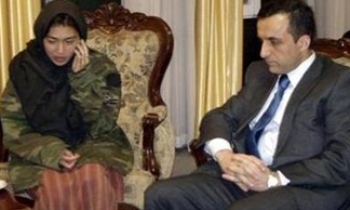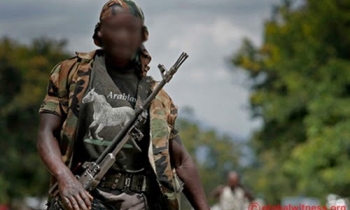On the face of it, Egypt's ruling National Democratic Party (NDP) may have scored a facile victory garnering as much as 72 per cent of the seats in the monthlong parliamentary elections, but the real picture stays hidden from what these statistics may indicate.

The story in brief: the elections were violent; even the official turnout was a modest 26.2 per cent; the only significant gains were made by the Islamist candidates; secular candidates were decimated; charges of rigging were rampant; and those who were caught in the violent electoral crossfire were bystander journalists.
According to Reporters sans Frontières (RSF), more than 50 journalists were prevented from covering the polling. Most of them were also subjected to violent attacks by the police, officials and even members of the public. "It is utterly unacceptable that so many journalists and media technicians were harassed, intimidated or beaten up just because they were doing their work by shooting footage or taking photos exposing polling irregularities," RSF said.
"By forbidding many TV crews to film polling stations, the Egyptian authorities deliberately prevented them from fulfilling their duty to report the news," RSF said. "We consider this behaviour to be intolerable and we call for the punishment of those responsible for the violence."
The NDP won 311 seats, while 112 went to independent candidates, including 88 to the banned but usually tolerated Muslim Brotherhood, according to a Xinhua report. Secular opposition parties performed poorly and managed nine seats. The 12 undecided seats will see repolling later because the courts cancelled election results either because of violence or other controversies. The polls were meant to decide 444 seats of the 454-member People's Assembly and the remaining 10 seats are appointed by the president.
The election, as the Los Angeles Times reported, had initially reignited hopes that genuine democratic governance was possible after five decades of autocracy. It had come on the heels of the first contested presidential election since the monarchy was overthrown in 1952. But the optimism was dashed as President Hosni Mubarak's heavyhanded regime made a travesty of the proceedings. The election was marred by widespread violations, rampant fraud, and the arrest and detention of hundreds of opposition supporters as it became clear over the last four weeks that Islamist candidates from the outlawed Muslim Brotherhood Party was likely to score a significant electoral victory.

The third and final phase of the elections, which took place on December 7, was particularly violent. In all, 15 journalists were prevented from working. Journalists working for the pan-Arab satellite TV station Al Jazeera and the independent daily Al-Masry Al-Youm were the most affected.
Reporter Leena El-Ghadban, who was covering the elections for Al Jazeera, and her crew consisting of cameraman Mohamed Ezz, soundman Mohamed Galal and driver Medhat Sayed Abdou, were prevented by state security agents from filming inside a polling station in Bandar-Domyat, 191 km north of Cairo.
The same thing happened to another Al-Jazeera reporter, Mohamed Yousef, in Al-A'arish, northeast of the capital. A third Al-Jazeera crew was harassed in El Sharqiya province, 83 km east of Cairo. The crew, consisting of reporter Sameer Omar, cameraman Yasser Sulaiman and Sulaiman's assistant, Ahmed Shaqi, fled under threat of having nitric acid thrown at them.
Al-Masry Al-Youm photographer Mohamed Ma'arouf was detained by the police in Domyat province for three hours. One of his colleagues, Mohamed El-Sa'eed, suffered tear gas inhalation and was held for two hours in a government building in Balteem, 200 km north of Cairo.
Another photographer, Hossam Fadl, narrowly escaped being teargassed in El-Mansoura, near the capital. When he returned to his car, he found all the tyres had been deflated. Fellow photographer Ahmed El-Masry was, meanwhile, attacked and beaten up by members of the El-Mansoura municipal council.

In the province of El-Sharqiya, photographer Ahmed Shaker was doused with petrol by individuals who then threatened to set him on fire if he did not leave immediately. Four Al-Masry Al-Youm employees – reporters Abdel-A'al Tala'at and Gamal Osman, photographer Abdel-Fattah Abbas and their driver – were badly beaten up by villagers in Shatoura, 490 km south of the capital, when they were mistaken for plainclothes intelligence agents. Amre Nabil, a photographer working for the Associated Press news agency, had to be hospitalised after being hit by a stone in the eye as he was covering the election in the same province.
Earlier, Asmaa Ali Hraiz, a female reporter for the opposition weekly newspaper Al-Karama, was kidnapped by state security agents near a polling station in the city of Shoubra al-Kheima, according to the Committee to Protect Journalists (CPJ) and the Egyptian Organisation for Human Rights (EOHR). Her kidnappers confiscated her cell phone, camera and a gold necklace, and threatened to rape her. Hraiz was beaten unconscious and dumped under a bridge in Cairo. She suffered broken ribs, serious injuries to her right arm, and bruises on the spine.
While journalists found themselves at the receiving end from all stakeholders in the election, a report by the Cairo Institute for Human Rights Studies (CIHRS) said that media outlets had shown a clear bias towards the ruling party. CIHRS said that despite the state-owned television stations' varied coverage – in terms of quantity – of the primary political currents that participated in the parliamentary elections, there was a bias towards the NDP in terms of quantity, orientation, and quality of coverage, most of which was positive, according to the report's details on the website of the International Freedom of Expression Exchange (IFEX).
The nature of the political struggle witnessed during these elections was reflected in television coverage in that the two largest competing powers, the NDP and the Muslim Brotherhood, received the greatest amount of television coverage although most of that concerning the latter was negative. It was likewise observed that the private stations – especially Al-Mehwar Channel – tended to provide more expansive coverage to the NDP in comparison to the other political currents.

Newspapers allocated significant space for the coverage of election campaigns. The state-funded newspapers lost their first place position in terms of space allocated for parliamentary election coverage; the private newspaper Al-Masri Al-Yawm, followed by the independent Nahdat Misr, came at the head of papers in terms of space allocated to election coverage. As for the state-owned press, Al-Gomhoriya came first in this category, followed by the daily Rose Al-Youssef and Al-Ahram.
The state-owned press was blatantly biased in favour of the ruling party's candidates. The most extreme in this behaviour was Al-Akhbar newspaper with 83 per cent of its total coverage of various political parties and powers going to the NDP, followed by Al-Masa' at 75 per cent, Akhbar Al-Yawm at 67 per cent and Al-Ahram at 62 per cent. In the independent press, coverage of the NDP was highest in Sawt Al-Umma newspaper at 84 per cent, Al-Fagr at 82 per cent, and Al-Dustuur at 75 per cent, although the majority of such coverage in these newspapers was critical of the NDP.
The most prominent evidence of the bias of the state-owned papers was the repeated allocation of the first half of their front pages to coverage of NDP press conferences and candidates or the publication of positive accomplishments and decisions taken by the government or the president during the election campaigning period. These newspapers also allocated additional prominent spaces for coverage of NDP candidates within their inner pages. Typically these were placed in the first half of a page and were usually accompanied by large photographs that were sometimes in colour.

The manner of addressing the violence that marred the elections varied perceptibly between the state-owned and private media, and in particular the independent newspapers. In most of its coverage, the national press purposely affected ignorance of the responsibility of the government and security agencies for the violations – as did the statements of the committee supervising the elections and the National Council for Human Rights. In contrast, the coverage of the most prominent independent papers was characterised by objectivity, professionalism, and neutrality.
As of now, the strong showing of the fundamentalists has triggered panic reactions among secular Egyptians, Christians and many women, who fear that the Brotherhood will try to impose Saudi-style restrictions on personal rights – and even try to impose Islamic rule. Egypt's constitution calls Sharia "the principle source" of legislation.
But apart from rules on divorce, inheritance and other family issues, the country's laws are mainly secular. Alcohol is legal, and Islamic punishments like lashing and beheading – as occur in Saudi Arabia – are unknown. Egyptian society is conservative, with most women wearing head scarves or veils. But that is not mandatory, and women have broader rights and mix with men far more freely than in Saudi Arabia and many Persian Gulf countries.









